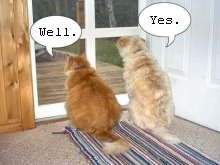I called to Buster the other day as he headed into the woods, nose to the ground, tail up, tail wagging. We had been walking one way and then he went another so I stopped, called, waited. He ignored me. A familiar feeling of exasperation welled up, and then I remembered: Buster is deaf. This is a recent development, and as I headed after him I thought how nice it must be, trotting along, no longer able to hear someone else's suggestions of what one might do, where one might go, how one might behave. I thought how happy he must be in his deafness. I caught up to him, lightly tapped his waggling rear, and he jumped and turned, looking at me with surprise. I made a backward wave motion with my right hand, a gesture he recognizes as "come with me," and he obliged.
What I wonder is: Does Buster know he's deaf? Perhaps all he knows is that suddenly - or gradually - there is a lot less to hear. He does acknowledge whistles and sharp claps. I wonder if he wonders why those are the only sounds I seem to make anymore.
Buster has always had a mind of his own. He is unconcerned about what others think of him, more so than any being I have ever known. Often I'll catch him considering an action, something he seems to know he's not supposed to do, but the consideration is: Can I get away with it? If he thinks yes, he does it. If he thinks not, he abandons the idea and moves along. Lately this concerns coyote poop, which Buster finds delectable and I find disgusting. It is an ongoing battle. When he finds a stash he sniffs it thoroughly. If it passes inspection, he'll start chomping away. Once I catch on and start making my way over to him, his mental wheels begin to turn. How long can he hold his ground? Can he finish this morsel and search for another? He gauges distance, he gauges pace. His goal is to swipe as much coyote poop as possible and run with it before I get near enough to catch him and empty his mouth. He wins, time after time. And once the poop is ingested, he carries on, skipping along, following wherever I'm headed, tail high, tail waving, back and forth, like a victory flag. Buster is 13 years old and nothing he has picked up in the woods, on the beach, or on the streets of Chicago has had much effect on him, except, I guess, to make him happy. There is a sense of joy in his jaunty gait. With a mind like that, wouldn't he be likely to think any problems that be come from without rather than within? In his quiet world, how could he know that it is he who has changed and not everyone else? Maybe if we could ask, Buster would say, "Finally, the world has shut up and is leaving me be."
We'll never know, of course, and not just because he's a dog. We all see, hear, smell, sense things differently. You say "poe-tay-toe" and I say "poe-ta-toe." I say, "My, the lake is blue today," and you say, "It looks green to me." We know it's all one and the same; we know it's all different. Buster may not hear the world around him, but still he listens. That's all that matters.
What I wonder is: Does Buster know he's deaf? Perhaps all he knows is that suddenly - or gradually - there is a lot less to hear. He does acknowledge whistles and sharp claps. I wonder if he wonders why those are the only sounds I seem to make anymore.
Buster has always had a mind of his own. He is unconcerned about what others think of him, more so than any being I have ever known. Often I'll catch him considering an action, something he seems to know he's not supposed to do, but the consideration is: Can I get away with it? If he thinks yes, he does it. If he thinks not, he abandons the idea and moves along. Lately this concerns coyote poop, which Buster finds delectable and I find disgusting. It is an ongoing battle. When he finds a stash he sniffs it thoroughly. If it passes inspection, he'll start chomping away. Once I catch on and start making my way over to him, his mental wheels begin to turn. How long can he hold his ground? Can he finish this morsel and search for another? He gauges distance, he gauges pace. His goal is to swipe as much coyote poop as possible and run with it before I get near enough to catch him and empty his mouth. He wins, time after time. And once the poop is ingested, he carries on, skipping along, following wherever I'm headed, tail high, tail waving, back and forth, like a victory flag. Buster is 13 years old and nothing he has picked up in the woods, on the beach, or on the streets of Chicago has had much effect on him, except, I guess, to make him happy. There is a sense of joy in his jaunty gait. With a mind like that, wouldn't he be likely to think any problems that be come from without rather than within? In his quiet world, how could he know that it is he who has changed and not everyone else? Maybe if we could ask, Buster would say, "Finally, the world has shut up and is leaving me be."
We'll never know, of course, and not just because he's a dog. We all see, hear, smell, sense things differently. You say "poe-tay-toe" and I say "poe-ta-toe." I say, "My, the lake is blue today," and you say, "It looks green to me." We know it's all one and the same; we know it's all different. Buster may not hear the world around him, but still he listens. That's all that matters.



